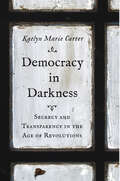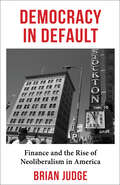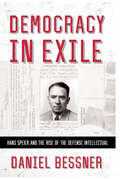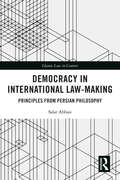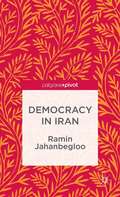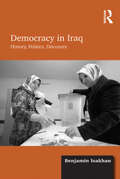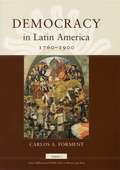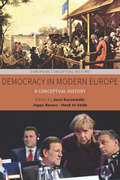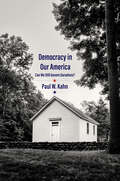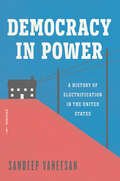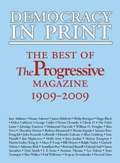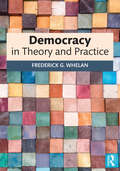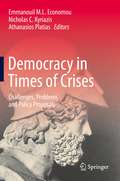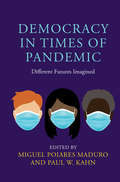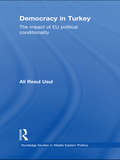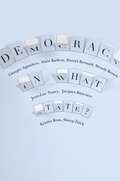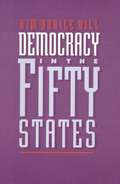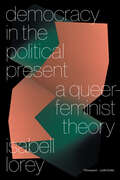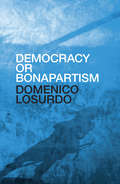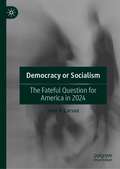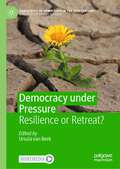- Table View
- List View
Democracy in Darkness: Secrecy and Transparency in the Age of Revolutions (The Lewis Walpole Series in Eighteenth-Century Culture and History)
by Katlyn Marie CarterHow debates over secrecy and transparency in politics during the eighteenth century shaped modern democracy Does democracy die in darkness, as the saying suggests? This book reveals that modern democracy was born in secrecy, despite the widespread conviction that transparency was its very essence. In the years preceding the American and French revolutions, state secrecy came to be seen as despotic—an instrument of monarchy. But as revolutionaries sought to fashion representative government, they faced a dilemma. In a context where gaining public trust seemed to demand transparency, was secrecy ever legitimate? Whether in Philadelphia or Paris, establishing popular sovereignty required navigating between an ideological imperative to eradicate secrets from the state and a practical need to limit transparency in government. The fight over this—dividing revolutionaries and vexing founders—would determine the nature of the world&’s first representative democracies. Unveiling modern democracy&’s surprisingly shadowy origins, Carter reshapes our understanding of how government by and for the people emerged during the Age of Revolutions.
Democracy in Default: Finance and the Rise of Neoliberalism in America
by Brian JudgeHow did neoliberalism arise? Faced with the crises of the 1970s, a coalition of neoliberal intellectuals, conservative politicians, and business interests carried out a vast project of walling off the economy from democracy, ensuring the dominance of finance—or so the conventional story goes. Democracy in Default offers a new perspective on the birth of neoliberalism, showing that this common narrative confuses cause and effect. Financialization was not the offspring of deregulation but the mechanism that allowed neoliberalism to take root.Brian Judge argues that financialization was a nearly spontaneous response to a crisis within liberalism. He examines how liberalism disavows the problem of distributive conflict, leaving it vulnerable when those conflicts erupt. When the postwar growth engine began to slow, finance promised a way out of the resulting political impasse, allowing liberal democracies to depoliticize questions of distribution and sustain the existing social and economic order. Elected officials were not simply captured or co-opted but willingly embraced financial solutions to their political problems. Unleashing the financial imperative to generate monetary returns, however, ushered in an all-encompassing transformation. Vivid case studies—the bankruptcy of Stockton, California; the investment strategy of the California Public Employees’ Retirement System; and the 2008 financial crisis—illustrate how the priorities of financial markets radically altered liberal democratic governance. Recasting the political and economic transformations of the past half century, Democracy in Default offers a bracing new account of the relationship between neoliberalism and financialization.
Democracy in Exile: Hans Speier and the Rise of the Defense Intellectual (The United States in the World)
by Daniel BessnerIn Democracy in Exile, Daniel Bessner explores the life of Hans Speier, one of the most significant figures in the history of U.S. defense policy. Bessner traces Speier's intellectual development from Weimar Germany to the Cold War United States, revealing how his European roots shaped the expert-driven approach to foreign policymaking that American elites institutionalized during and after World War II. A key figure in a transatlantic network of émigré policymakers and analysts, Speier helped establish novel institutions such as the RAND Corporation that transformed how U.S. foreign policy was made.Democracy in Exile highlights how social scientists like Speier left academia to create a "military-intellectual complex" that insulated American decision making from public opinion and that continues to shape U.S. defense policy today.
Democracy in International Law-Making: Principles from Persian Philosophy (Islamic Law in Context)
by Salar AbbasiThis book provides a critique of current international law-making and draws on a set of principles from Persian philosophers to present an alternative to influence the development of international law-making procedure. The work conceptualizes a substantive notion of democracy in order to regulate international law-making mechanisms under a set of principles developed between the twelfth and seventeenth centuries in Persia. What the author here names ‘democratic egalitarian multilateralism’ is founded on: the idea of ‘egalitarian law’ by Suhrawardi, the account of ‘substantial motion’ by Mulla Sadra, and the ideal of ‘intercultural dialectical democracy’ developed by Rūmī. Following a discussion of the conceptual flaws of the chartered and customary sources of international law, it is argued that ‘democratic egalitarian multilateralism’ could be a source for a set of principles to regulate the procedures through which international treaties are made as well as a criterion for customary international law-ascertainment. Presenting an alternative, drawn from a less dominant culture, to the established ideas of international law-making the book will be essential reading for researchers and academics working in public international law, history of law, legal theory, comparative legal theory, Islamic law, and history.
Democracy in Iran
by Misagh ParsaIn Misagh Parsa's view, the outlook for democracy in Iran is stark. Gradual reforms will not be sufficient for real change: the government must fundamentally rethink its commitment to the role of religion in politics and civic life. For Iran to democratize, the options are narrowing to a single path: another revolution.
Democracy in Iran
by Ramin JahanbeglooDemocratic government is something that has eluded Iran despite a series of non-violent revolutions aimed at establishing a system of governance that would promote both public freedom and political accountability. This explores the obstacles to the growth of democracy in Iran and posits a plan for non-violent action to help Iranians achieve it.
Democracy in Iraq: History, Politics, Discourse
by Benjamin IsakhanThis book proposes a significant reassessment of the history of Iraq, documenting democratic experiences from ancient Mesopotamia through to the US occupation. Such an analysis takes to task claims that the 'West' has a uniquely democratic history and a responsibility to spread democracy across the world. It also reveals that Iraq has a democratic history all of its own, from ancient Middle Eastern assemblies and classical Islamic theology and philosophy, through to the myriad political parties, newspapers and protest movements of more recent times. This book argues that the democratic history of Iraq could serve as a powerful political and discursive tool where the Iraqi people may come to feel a sense of ownership over democracy and take pride in endorsing it. This could go a long way towards mitigating the current conflicts across the nation and in stabilizing and legitimating its troubled democracy. Taking an interdisciplinary approach and referring to some of the most influential critical theorists to question ideological assumptions about democracy and its history, this book is useful to those interested in political and legal history, human rights and democracy.
Democracy in Latin America, 1760–1900: Civic Selfhood and Public Life in Mexico and Peru (Morality And Society Ser. #1)
by Carlos A. FormentCarlos Forment's aim in this highly ambitious work is to write the book that Tocqueville would have written had he traveled to Latin America instead of the United States. Drawing on an astonishing level of research, Forment pored over countless newspapers, partisan pamphlets, tabloids, journals, private letters, and travelogues to show in this study how citizens of Latin America established strong democratic traditions in their countries through the practice of democracy in their everyday lives. This first volume of Democracy in Latin America considers the development of democratic life in Mexico and Peru from independence to the late 1890s. Forment traces the emergence of hundreds of political, economic, and civic associations run by citizens in both nations and shows how these organizations became models of and for democracy in the face of dictatorship and immense economic hardship. His is the first book to show the presence in Latin America of civic democracy, something that gave men and women in that region an alternative to market- and state-centered forms of life. In looking beneath institutions of government to uncover local and civil organizations in public life, Forment ultimately uncovers a tradition of edification and inculcation that shaped democratic practices in Latin America profoundly. This tradition, he reveals, was stronger in Mexico than in Peru, but its basic outlines were similar in both nations and included a unique form of what Forment calls Civic Catholicism in order to distinguish itself from civic republicanism, the dominant political model throughout the rest of the Western world.
Democracy in Moderation
by Paul O. CarreseDemocracy in Moderation views constitutional liberal democracy as grounded in a principle of avoiding extremes and striking the right balance among its defining principles of liberty, equality, religion, and sustainable order, thus tempering tendencies toward sectarian excess. Such moderation originally informed liberal democracy, but now is neglected. Moderation can guide us intellectually and practically about domestic and foreign policy debates, but also serve the sustainability of the constitutional, liberal republic as a whole. Our recent theory thus doesn't help our practice, given our concerns about polarization and sectarianism in ideas, policy, and politics. A rediscovery of Montesquieu and his legacy in shaping America's complex political order, including influence on Washington's practical moderation and Tocqueville's philosophical moderation, addresses these enduring theoretical and practical problems. Moderation also offers a deeper theory of leadership or statesmanship, particularly regarding religion and politics, and of foreign policy and strategy rooted in liberal democracy's first principles.
Democracy in Modern Europe: A Conceptual History (European Conceptual History #5)
by Henk Te Velde Jussi Kurunmäki Jeppe NeversAs one of the most influential ideas in modern European history, democracy has fundamentally reshaped not only the landscape of governance, but also social and political thought throughout the world. Democracy in Modern Europe surveys the conceptual history of democracy in modern Europe, from the Industrial Revolutions of the nineteenth century through both world wars and the rise of welfare states to the present era of the European Union. Exploring individual countries as well as regional dynamics, this volume comprises a tightly organized, comprehensive, and thoroughly up-to-date exploration of a foundational issue in European political and intellectual history.
Democracy in Modern Europe: A Conceptual History (European Conceptual History)
by Henk Te Velde Jussi Kurunmäki Jeppe NeversAs one of the most influential ideas in modern European history, democracy has fundamentally reshaped not only the landscape of governance, but also social and political thought throughout the world. Democracy in Modern Europe surveys the conceptual history of democracy in modern Europe, from the Industrial Revolutions of the nineteenth century through both world wars and the rise of welfare states to the present era of the European Union. Exploring individual countries as well as regional dynamics, this volume comprises a tightly organized, comprehensive, and thoroughly up-to-date exploration of a foundational issue in European political and intellectual history.
Democracy in Our America: Can We Still Govern Ourselves?
by Paul W. KahnOne of America’s most distinguished political theorists examines what happens when national politics enters a small New England town After the election of 2016 and, even more urgently, after the election of 2020, many citizens looked at the economic and cultural divisions that were causing deep disruptions in American politics and asked, “What is happening to us?” Paul W. Kahn explores these fundamental changes as they show themselves in a small New England town—his home of twenty-five years, Killingworth, Connecticut. His inquiry grounds a democratic theory that puts volunteering, not voting, at its center. Absent active participation, citizens lose the capacity for judgment that comes from working with others to solve real problems. Volunteering, however, is under existential threat today. Changes in civil society, commerce, employment, and public opinion formation have isolated families from each other and from their communities. Even middle-class families live under financial stress, uncertain of their children’s future, and without the support of civil society. Local media has disappeared. Residents do not have the time, information, or interest to volunteer. Under these conditions, national polarization enters local politics, which becomes yet another site for national conflict. To save our democracy, Kahn concludes, we need to find ways of matching opportunities for participation to the ways we live our lives today.
Democracy in Power: A History of Electrification in the United States
by Sandeep VaheesanPrivate money, public good, and the original fight for control of America’s energy industry. Until the 1930s, financial interests dominated electrical power in the United States. That changed with President Franklin D. Roosevelt’s New Deal which restructured the industry. The government expanded public ownership, famously through the Tennessee Valley Authority, and promoted a new kind of utility: the rural electric cooperative that brought light and power to millions in the countryside. Since then, public and cooperative utilities have persisted as an alternative to shareholder control. Democracy in Power traces the rise of publicly governed utilities in the twentieth-century electrification of America. Sandeep Vaheesan shows that the path to accountability in America’s power sector was beset by bureaucratic challenges and fierce private resistance. Through a detailed and critical examination of this evolution, Vaheesan offers a blueprint for a publicly led and managed path to decarbonization. Democracy in Power is at once an essential history, a deeply relevant accounting of successes and failures, and a guide on how to avoid repeating past mistakes.
Democracy in Print: The Best of The Progressive Magazine, 1909-2009
by Matthew RothschildDemocracy in Printcaptures many of the most influential voices from a century of United States history who have spoken out on the struggle to make real the promise of democracy for all Americans, railed against abuses of corporate power, renounced American empire, championed environmental causes, opposed war, and waged peace. It chronicles voices of the women’s rights movement, the civil rights movement, the labor movement, and the gay rights movement. And on every page, it declares the importance of an independent media, by culling the best ofThe Progressivemagazine over the last one hundred years. Readers will discover the vision of the magazine’s founder, Robert “Fighting Bob” La Follette, and his suffragist wife, Belle Case La Follette. They’ll find historic gems from the likes of Jane Addams, Carl Sandburg, Huey Long, and John Kenneth Galbraith, and profound essays by Theodore Dreiser, Barbara Ehrenreich, Noam Chomsky, Upton Sinclair, Arundhati Roy, James Baldwin, Edwidge Danticat, and Edward Said. The collection is leavened with humor from Kate Clinton, Will Durst, Michael Feldman, and Molly Ivins, and graced by poems from such writers as Mahmoud Darwish, Rita Dove, Mart n Espada, Maxine Kumin, Adrienne Rich, and Sandra Cisneros. Fascinating interviews bring readers into conversations with prominent cultural figures, including Chuck D, the Dalai Lama, Allen Ginsberg, Amy Goodman, Harold Pinter, Patti Smith, Susan Sarandon, and Yevgeny Yevtushenko. Eminently browsable, this book is for anyone concerned with American democracy, the global community, and the perils of the planet. With contributions by actors and Supreme Court justices, comedians and Nobel Prize-winners,Democracy in Printoffers all readers nourishing food for thought.
Democracy in Theory and Practice
by Frederick G. WhelanDemocracy in Theory and Practice presents an authoritative overview of democratic theory today. Its distinctive approach links theory to practice, emphasizing the wide variety of institutions and procedures through which core democratic principles are implemented and the normative and practical dimensions of the choices to be made among these alternatives. Designed for courses at both the undergraduate and graduate level, the book features eighteen chapters organized thematically and divided into sections and subsections for easy reference; historical and current examples, citations for specific ideas, annotated references, and further readings throughout enhance the volume's utility for students, scholars, and researchers. Sidebars give biographical sketches of classic theorists and democratic ideas from the US founders and constitutional tradition. Featured topics discussed include: Majority Rule; Participation; Deliberation; Accountability; Representation; Constitutionalism; Electoral Laws; Parties; Legislative, Executive, and Judicial Functions. The Boundary Problem; The "All-Affected" Principle; Contested Senses of Liberal and Procedural Democracy; The Pros and Cons of Term Limits; Proportional Representation; Referendums; Problems of Democratic Transparency and Reversibility. Written by a leading authority in the field, Frederick G. Whelan encourages us to think of the many alternative ways of putting democracy into practice and of these alternatives as requiring choices. This diversity means that there is no unique or correct democratic outcome from a given set of preferences, since outcomes are shaped by the methods followed in reaching them.
Democracy in Times of Crises: Challenges, Problems and Policy Proposals
by Nicholas C. Kyriazis Emmanouil M.L. Economou Athanasios PlatiasInspired by the democratic origins of the Greek naval victory at Salamis, the book discusses the current pressing issues of democracy worldwide. In 12 carefully selected chapters, well-renowned scholars from around the globe discuss topics such as Brexit, Euroscepticism, or the rise of populism. The authors further analyze various aspects of democracy, as well as various types of democratic regimes, such as mixed government, direct democracy, and cases of quasi democracies. While doing so, they relate this discussion to the pivotal question of how the quality of democracy today can be improved, seeking answers and solutions to current pending problems at the global level. This book is the second out of two edited volumes as a sequel of an international academic conference titled Salamis and Democracy: 2500 Years After that took place between October 3rd and October 5th, 2020, on the occasion of the 2500th anniversary of the great historical event of the Battle of Salamis, which saved Greek culture and the newly founded democratic regimes throughout the Hellenic world during the Classical period (508-323 BCE). The book is a must-read for scholars and students of political science, economics, and law, as well as policy-makers interested in a better understanding of democracy, governance, populism, social choice, and constitutional law.
Democracy in Times of Pandemic: Different Futures Imagined
by Paul W. Kahn Miguel Poiares MaduroThe COVID-19 pandemic has presented an important case study, on a global scale, of how democracy works - and fails to work - today. From leadership to citizenship, from due process to checks and balances, from globalization to misinformation, from solidarity within and across borders to the role of expertise, key democratic concepts both old and new are now being put to the test. The future of democracy around the world is at issue as today's governments manage their responses to the pandemic. Bringing together some of today's most creative thinkers, these essays offer a variety of inquiries into democracy during the global pandemic with a view to imagining post-crisis political conditions. Representing different regions and disciplines, including law, politics, philosophy, religion, and sociology, eighteen voices offer different outlooks - optimistic and pessimistic - on the future.
Democracy in Turkey: The Impact of EU Political Conditionality (Routledge Studies in Middle Eastern Politics)
by Ali Resul UsulThis book examines the impact of European political conditionality on the process of democratization in Turkey over a twenty year period. Employing theoretical and conceptual approaches to the issue of EU conditionality, the author compares the case of Turkey to that of other European nations. Arguing that Turkey became vulnerable to the European conditionality when it applied for membership in 1987, he shows how the political reforms demanded of Turkey were not fully carried out as the EU had not in essence accepted Turkey as an official candidate during this period. The EU has started to exert real ‘active leverage’ since Turkey was declared an official candidate in 1999, and the author explores how these conditions have exerted a positive influence on democratic consolidation in Turkey. However, its effectiveness in this regard has diminished to a significant extent due to a number of problems that have continued to remain central in EU-Turkey relations. This comprehensive analysis of Turkey-EU political relations and democratization places the case of Turkey within an international context. As such, it will be of interest not only to those studying Turkish politics, government and democracy, but anyone working in the area of international relations and the EU.
Democracy in What State?
by Giorgio Agamben Wendy Brown William Mccuaig Alain Badiou Daniel Bensaid Jean-Luc Nancy Kristin Ross"Is it meaningful to call oneself a democrat? And if so, how do you interpret the word?"In responding to this question, eight iconoclastic thinkers prove the rich potential of democracy, along with its critical weaknesses, and reconceive the practice to accommodate new political and cultural realities. Giorgio Agamben traces the tense history of constitutions and their coexistence with various governments. Alain Badiou contrasts current democratic practice with democratic communism. Daniel Bensaid ponders the institutionalization of democracy, while Wendy Brown discusses the democratization of society under neoliberalism. Jean-Luc Nancy measures the difference between democracy as a form of rule and as a human end, and Jacques Rancière highlights its egalitarian nature. Kristin Ross identifies hierarchical relationships within democratic practice, and Slavoj i ek complicates the distinction between those who desire to own the state and those who wish to do without it. Concentrating on the classical roots of democracy and its changing meaning over time and within different contexts, these essays uniquely defend what is left of the left-wing tradition after the fall of Soviet communism. They confront disincentives to active democratic participation that have caused voter turnout to decline in western countries, and they address electoral indifference by invoking and reviving the tradition of citizen involvement. Passionately written and theoretically rich, this collection speaks to all facets of modern political and democratic debate.
Democracy in What State? (New Directions in Critical Theory #11)
by Giorgio Agamben Slavoj Žižek Wendy Brown Alain Badiou Daniel Bensaid Jean-Luc Nancy Kristin Ross Jacques Rancière"Is it meaningful to call oneself a democrat? And if so, how do you interpret the word?"In responding to this question, eight iconoclastic thinkers prove the rich potential of democracy, along with its critical weaknesses, and reconceive the practice to accommodate new political and cultural realities. Giorgio Agamben traces the tense history of constitutions and their coexistence with various governments. Alain Badiou contrasts current democratic practice with democratic communism. Daniel Bensaid ponders the institutionalization of democracy, while Wendy Brown discusses the democratization of society under neoliberalism. Jean-Luc Nancy measures the difference between democracy as a form of rule and as a human end, and Jacques Rancière highlights its egalitarian nature. Kristin Ross identifies hierarchical relationships within democratic practice, and Slavoj Zizek complicates the distinction between those who desire to own the state and those who wish to do without it.Concentrating on the classical roots of democracy and its changing meaning over time and within different contexts, these essays uniquely defend what is left of the left-wing tradition after the fall of Soviet communism. They confront disincentives to active democratic participation that have caused voter turnout to decline in western countries, and they address electoral indifference by invoking and reviving the tradition of citizen involvement. Passionately written and theoretically rich, this collection speaks to all facets of modern political and democratic debate.
Democracy in the Fifty States
by Kim Quaile HillThe disillusionment of scholars and nonscholars alike who conclude that democracy in the United States has failed calls for an innovative examination of our democratic processes. Kim Quaile Hill, arguing that these critics have been too hasty in their judgment, presents the first comprehensive assessment on the extent of achieved democratization. He examines the range of representative democracy in the states by comparing them on the key components of democracy indicated in empirical democratic theory-equal rights to vote, competitiveness among political parties, and the degree of mass participation. Building on empirical democratic theory and scholarship in comparative state politics, Hill follows the tradition of prominent cross-national studies to develop this intranational analysis of democratic processes. These analyses provide considerable evidence that the states vary substantially in the extent to which they approximate the democratic ideal. Hill begins with an evaluation of each of the primary components of democracy and how states fulfilled them. He also replicates this analysis for the late 1940s and the early 1980s, two periods chosen for their historical distinctiveness in terms of legal regimes relevant to democracy in the states. The preceding analysis results in comprehensive measures of democracy in the states. For readers skeptical of gauging such a complex concept as democratization, Hill provides an empirical demonstration of the validity and reliability of the measures. And, for critics who still ask "Does democracy deliver the goods?", he presents strong evidence that more-democratic states adopt more equitable policies for citizens' welfare and ensure a greater range of civil rights than do less-democratic states.
Democracy in the Political Present: A Queer-Feminist Theory
by Isabell Lorey&“Presentist democracy is without a people and without nation. Rather than regimes of borders and migration, its borders are sexism and racism, homo- and transphobia, colonialism and extractivism.&”In the midst of the crises and threats to liberal democracy, Isabell Lorey develops a democracy in the present tense; one which breaks open political certainties and linear concepts of progress and growth. Her queer feminist political theory formulates a fundamental critique of masculinist concepts of the people, representation, institutions, and the multitude. In doing so, she unfolds an original concept of a presentist democracy based on care and interrelatedness, on the irreducibility of responsibilities—one which cannot be conceived of without social movements&’ past struggles and current practices.
Democracy or Bonapartism: Two Centuries of War on Democracy
by Domenico LosurdoHOW AN IRON FIST DONNED DEMOCRACY&’S VELVET GLOVEThe history of universal suffrage is best understood as a conflict between liberal elites and democractic workers&’ movements, according to Domenico Losurdo. John Stuart Mill, for example, argued that electoral influence should be more pronounced among the educated – and wealthy – than among those working with their hands. Every vote ought not to be counted the same. Countries with deep liberal roots have historically been quick to restrain the spread of the franchise, persisting in discrimination based on property, race, and gender. In this context, the rise of popular presidents and premiers, vested with extraordinary powers, has served to stimy attempts to associate politically and mobilize for meaningful change.This is modern Bonapartism, a soft authoritarianism in which popularity, stirred up by a news media dominated by the interests of the rich, replaces true democratic expression. As alternatives to this system drift toward the horizon, Bonapartism is set to become the dominant political regime of our era. Understanding the history of its development and the contradictory forces behind it may permit us to move towards true democracy.Praise for LIBERALISM: A COUNTER-HISTORY&‘Losurdo is almost unbelievably well-read&’- JACOBIN&‘A brilliant exercise in unmasking liberal pretensions, surveying over three centuries with magisterial command of the sources&’- FINANCIAL TIMES&‘Stimulatingly uncovers the contradictions of an ideology that is much too self-righteously invoked&’- PANKAJ MISHRA, GUARDIAN&‘A book of wide reference and real erudition&’- TIMES LITERARY SUPPLEMENT&‘The book is a historically grounded, very accessible critique of liberalism, complementing a growing literature critical of liberalism&’- CHOICEPraise for WAR AND REVOLUTION: RETHINKING THE TWENTIETH CENTURY&‘War and Revolution is a relentless document. It is dense and disconcerting. This is precisely why it should be considered one of the most important history books written since 9/11&’- RON JACOBS, COUNTERPUNCH
Democracy or Socialism: The Fateful Question for America in 2024
by Sven R. LarsonThis book discusses socialism and democracy. It approaches socialism not as a label but as an ideology. Based on a careful examination of what socialism is, traced back to Karl Marx, this book explains the tense relationship between socialism and democracy and how it has influenced political thought and practice in both Europe and America. This book carefully avoids conventional wisdom, seeking instead to originate its definition and analysis of socialism in its political theory and practice. Building on the relationship between socialism and democracy, the book explores how this uneasy roommate agreement may affect America’s future.
Democracy under Pressure: Resilience or Retreat? (Challenges to Democracy in the 21st Century)
by Ursula Van BeekThis book identifies the main factors shaping the fortunes of democracy globally. Why do some democracies in the same region and presumably subject to similar global influences remain stable while others regress? This is the question guiding all the authors of this edited book. In the search for answers, they examine 16 democracies in paired and tripled comparisons in sub-Saharan Africa, North and Latin America, East Asia, Western and Central Europe, along with two polar cases. Insights from the perspectives of history, political science, economics and international relations are offered along with a sketch of possible future scenarios. Combining approaches anchored in the analytical tradition with empirical case studies and given the broad range of topics, this book is bound to be of interest not only to students and practitioners of democracy but also to the broader academic and general readership.
